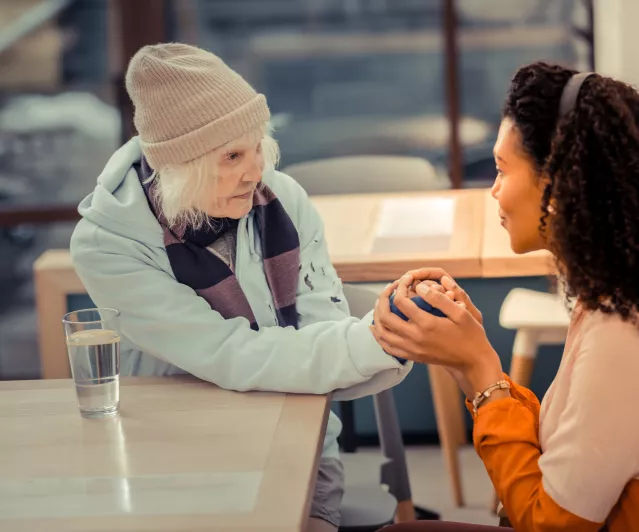
There are more and more elderly people in the Netherlands. Moreover, the number of elderly people with mental health problems is increasing. Old age is often accompanied by a loss of health and social contacts. The loss of a partner, for instance, can cause or re-invoke psychological problems in someone with a shaky balance. Often, several problems occur simultaneously.
What is the motivation for the project?
Care workers and informal carers play an important role in caring for these elderly people. In practice, they experience bottlenecks which multidisciplinary cooperation with employees of other organisations could solve. For example, if staff find it difficult to provide care for clients with psychological problems, they often have difficulty finding other care providers. As a result, they often spend (too) long looking for solutions themselves, which sometimes they do not find. The client's perspective is also not always very clear.
What problem does the project solve?
To jointly ensure good care and support for the elderly, tailored to the needs of these elderly, a network was formed between the geriatric care organisation Noorderbreedte, Het Friese Land Home Care, Van Andel geriatric psychiatry of GGZ Friesland, the Amaryllis welfare organisation, the Aldlân general practice and the support organisation for the first line ROS Friesland. The associate professor on Elderly people with mental health problems forms the link with NHL Stenden University of Applied Sciences. They want to offer customised services and utilise each others' expertise in complex care issues and/or problem behaviour of the elderly. This includes elderly people with psychological problems (also in combination with somatic or cognitive problems) and a cohesive chain network.
Project approach
Interviews held with employees of the various organisations revealed four themes: the identification of psychological problems (important, but also difficult), the exchange of expertise (does not yet happen due to a high threshold), mutual contact (pleasant, but reaching each other is difficult) and lack of action (especially in the case of loneliness and/or depression and with care avoiders and/or aggression). Together, several interventions were developed, aimed at mutual training and coaching and at getting to know and be able to reach each other better. The mutual education and coaching is about gaining more insight into clients with depression and clients with aggression, how to deal with these clients and what the possibilities are for the clients.
Project team
The project team that coordinates the project consists of representatives from the organisations participating in the network. The project leader is Gea van Dijk. The interventions have been developed by employees of the network organisations together with students of NHL Stenden Hogeschool. Clients and client representatives were involved in the project as much as possible. Several students from NHL Stenden University of Applied Sciences have done their graduation or minor research in the project and have made an important contribution.
Main results
Five tools and interventions have been developed that staff and older people can use together:
- A "roadmap" for the elderly. This is a handy booklet that lists the care providers and others who are involved with the older person, with their details and how they can be reached.
- A "guide to the neighbourhood" that lists various activities in the neighbourhood and the organisations that are important to the older person, with their contact details, in a form that is also suitable for the clients themselves.
- 'In Gesprek!': an organised conversation between the older person and those involved with him or her, such as informal carers and professionals, about what is bothering him or her, why this is the case and what could provide relief.
- In Gesprek! A'. Multidisciplinary learning on the basis of an anonymous case, for professional caregivers from different organisations or for students from different training courses.
- Network meetings for employees, to get to know each other and to learn more about mental health problems in the elderly.
As initial results of using the tools and interventions, the staff members involved say that they have gained more knowledge about depression, signalling depression and the next steps that can be taken for the benefit of the client. They also say that they have gained more knowledge about where aggression can come from and have developed skills in how to be more cooperative and set boundaries. The knowledge and skills learned were immediately applied in practice. The self-confidence of the staff has increased as a result of support from each other and tips for dealing with clients.
The staff learned about cooperation, what others do, how and when to refer to and involve others. The network of the employees has been enlarged and getting to know each other helps in contacting each other. There is also more awareness and understanding of the organisations and activities in the neighbourhood. People can already find each other better.
Further implementation and assurance
These tools and interventions will be used further in Leeuwarden and surroundings, and possibly further in Friesland, through an implementation process, in which securing is a part. Other organisations will also be able to use the developed tools and interventions or will be involved in this process.




